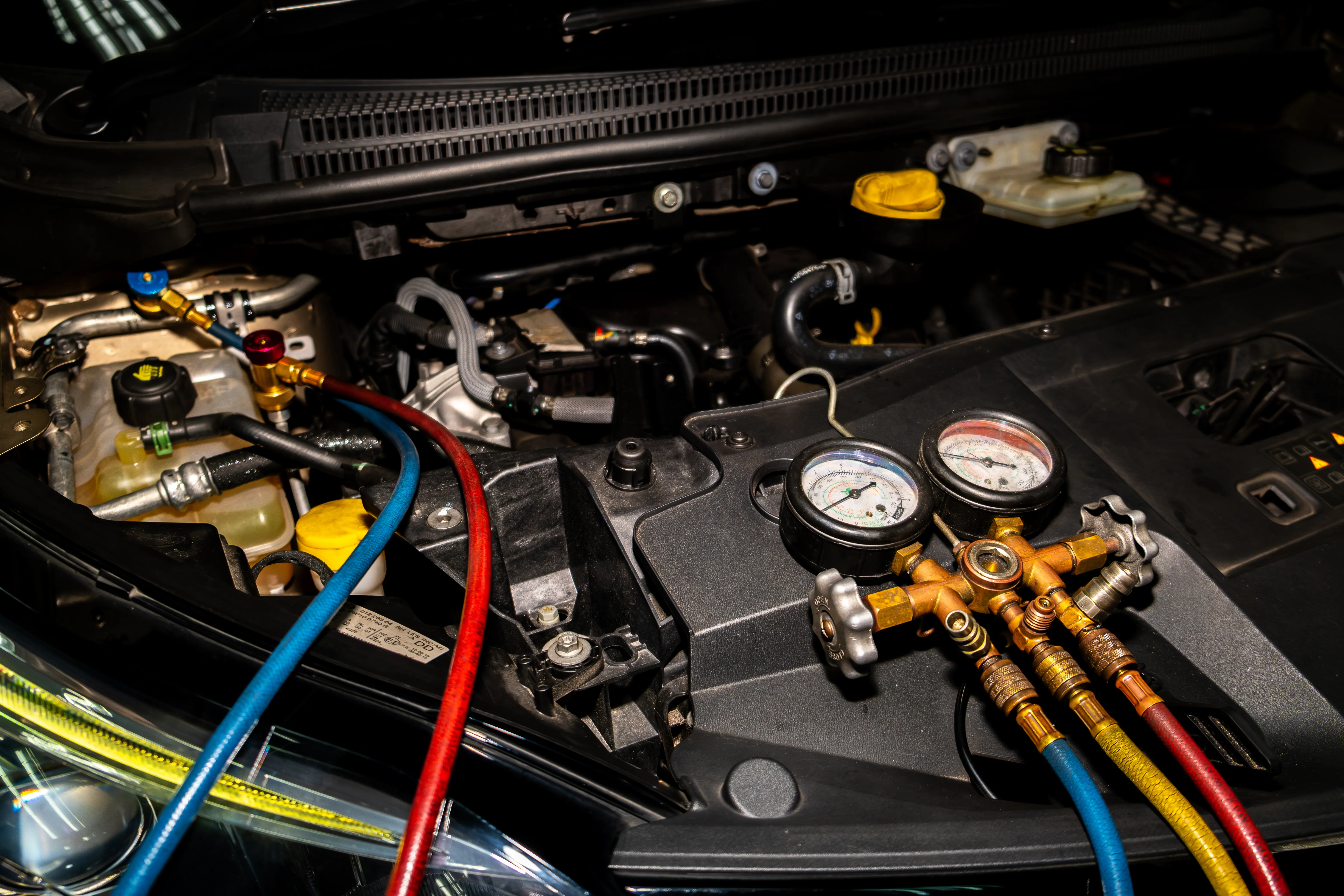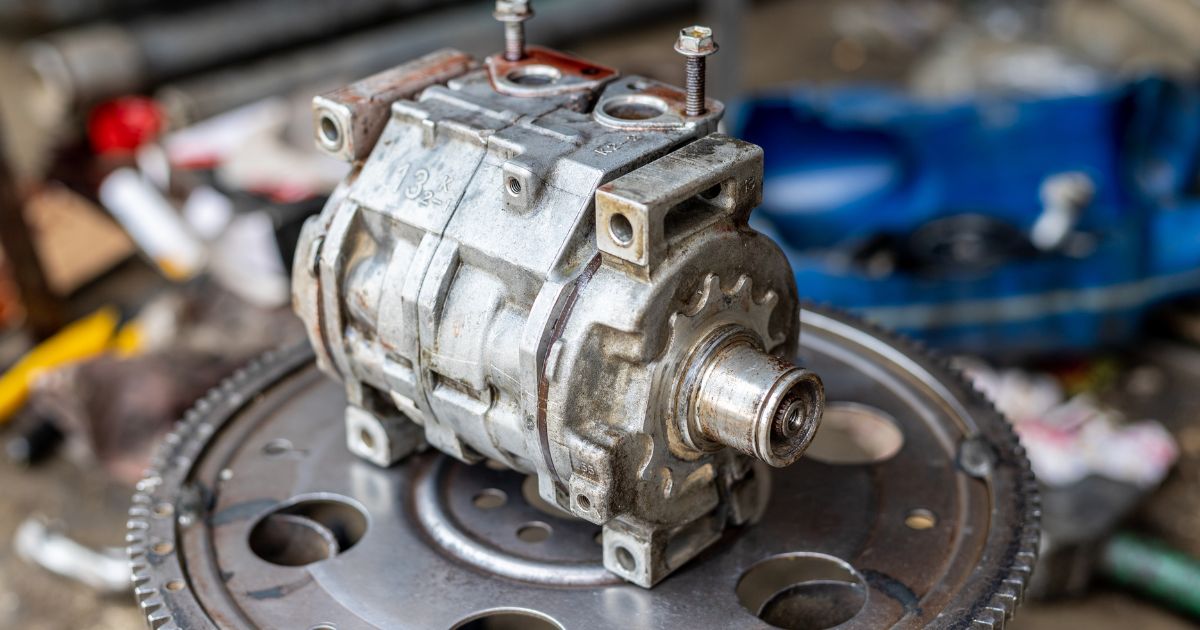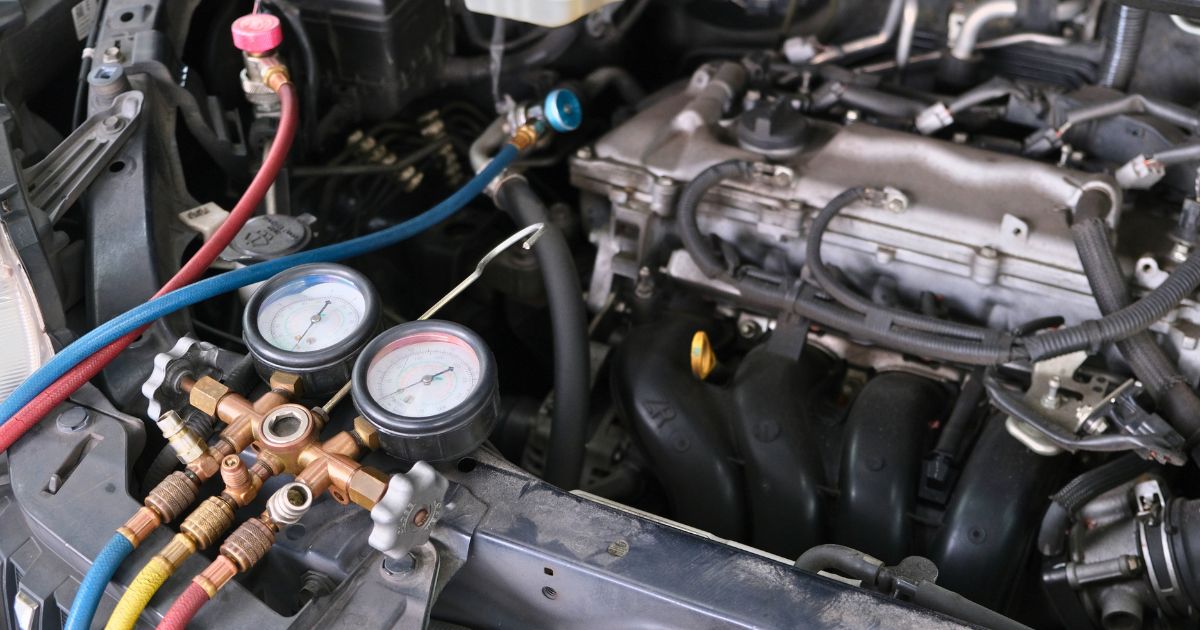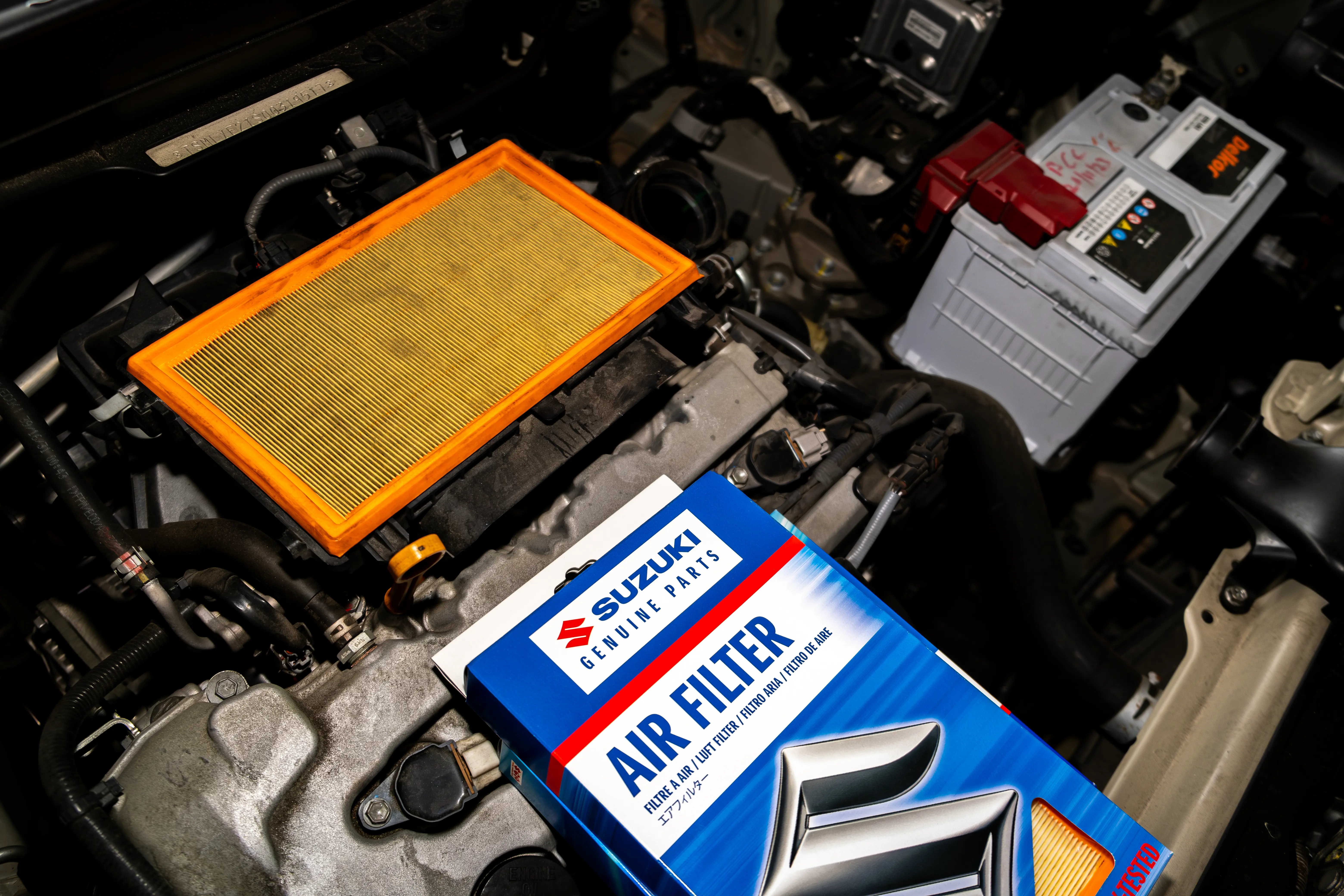Why Your Car Air-Con Isn’t Cold and When to Service It


There’s nothing quite as frustrating as stepping into your car on a hot Singapore afternoon, turning on the air-con and realising the air blowing out isn’t cold. In a country where temperatures regularly hover above 30°C, a well-functioning air-conditioning system isn’t a luxury - it’s a necessity.
Yet, for many drivers, the air-con slowly loses its cooling power over time, often without warning. What starts as “slightly less cold” can quickly turn into “barely cool at all.” While it may seem like a minor inconvenience at first, weak cooling is often a symptom of underlying mechanical or electrical issues that, if ignored, can lead to costly repairs later on.
This article breaks down the most common reasons your car air-con isn’t as cold as it used to be, signs that it’s time for servicing, and how workshops like BCC Automotive identify and fix these issues before they worsen.
If you’ve ever wondered when to service your air-con - or how often it really needs attention - this guide will help you understand the facts, not just the myths.
Common Reasons Why Your Car Air-Con Isn’t Cold
A car’s air-conditioning system is more complex than it looks. Cooling performance depends on several components working in sync - refrigerant flow, compressor pressure, sensors, and even airflow balance. When any of these go off, your air-con stops keeping up with Singapore’s heat.
Here are some of the most common reasons why your car’s air-con might not be cooling as it should:
Low Refrigerant (Gas) Levels
Over time, refrigerant gas naturally depletes through microscopic leaks or normal wear. When levels drop too low, the system can’t absorb and expel heat efficiently - resulting in weak or warm air.
Signs include:
- Air that feels slightly cool but not cold.
- Hissing sounds near the compressor.
- Frost or condensation around air-con pipes.
In humid climates like Singapore’s, small leaks can worsen due to constant thermal expansion and contraction. That’s why periodic refrigerant top-ups and leak checks are recommended as part of regular air-con servicing.
Dirty or Clogged Cabin Filter
Your cabin filter traps dust, pollen, and pollutants before air enters the ventilation system. In Singapore’s dense urban environment - especially for drivers who park outdoors or in dusty areas - the filter can clog much faster than expected.
A clogged filter restricts airflow, making it feel like the air-con is weak even if it’s cooling properly. Replacing the cabin filter every 12 months or 20,000 km can make a noticeable difference.
(For a deeper explanation of how regular servicing helps extend your car’s lifespan, see our earlier post on How Often Should You Service Your Car in Singapore).
Faulty Compressor or Condenser

The compressor is the heart of your car’s air-con system - it circulates refrigerant and maintains pressure. If it’s malfunctioning, refrigerant flow becomes unstable and cooling efficiency drops drastically.
Meanwhile, the condenser (located near the radiator) can get blocked with debris or bent fins, preventing proper heat exchange. Symptoms include:
- Loud clicking or rattling when the A/C starts.
- Cold air that turns warm after a few minutes.
- Uneven cooling across vents.
Technicians at BCC Automotive often find this issue in cars that haven’t had routine air-con checks, especially after years of exposure to road dust and debris.
Electrical or Sensor Issues
Modern vehicles rely on multiple sensors and electronic control modules to manage air-con performance. A malfunctioning pressure sensor or relay switch can disrupt the compressor’s operation, preventing it from cycling correctly.
If you’ve noticed inconsistent cooling or intermittent function, a diagnostic scan can pinpoint the fault accurately - something we explained in detail in our blog on Car Diagnostics.
Lack of Regular Servicing
Neglecting routine maintenance allows moisture and contaminants to enter the air-con system. Over time, this forms sludge and corrosion inside the compressor or evaporator core.
We’ve seen many cases where a simple annual check could have prevented major repairs costing hundreds. Regular servicing ensures refrigerant levels, filters, and seals stay in good condition - keeping your system efficient and reliable.
Signs That Your Air-Con Needs Servicing
Sometimes, it’s not about a complete system failure - it’s about the subtle early signs that your air-con is starting to weaken. Catching these symptoms early can save you from more expensive repairs later.
Here are the most common indicators that your car’s air-conditioning system needs attention:
1. Weak or Uneven Airflow

If the air feels weak even at full blast, your cabin filter may be clogged, or your blower motor could be underperforming.
You might also notice that air feels strong from one vent but weak from another - a sign of airflow restriction or early evaporator blockage.
2. Air Isn’t Cold (or Takes Too Long to Cool)
This is the most obvious symptom and often, it’s not just about refrigerant levels.
Slow cooling can also mean compressor wear or sensor imbalance, especially in newer vehicles that rely on precise electronic control.
3. Unusual Noises When Air-Con Is On
Clicking, rattling, or high-pitched hissing sounds indicate internal pressure irregularities or failing compressor components.
If ignored, these noises can escalate into complete compressor failure, which is significantly more costly to repair.
4. Musty or Foul Smells from the Vents
That unpleasant odour is usually caused by mould or bacteria inside the evaporator core - common in Singapore’s humid climate.
A proper air-con cleaning or antibacterial treatment removes these contaminants, restoring fresh airflow.
5. Fogging Windows or Damp Interior
When humidity builds up inside your car or your windows fog quickly, it could signal a blocked evaporator drain or moisture imbalance.
These are small issues that can be resolved easily during regular servicing - but if ignored, may cause electrical corrosion.
💡 Pro Tip: If your air-con performance changes after refuelling, car wash, or heavy rain, it might not be coincidence - moisture ingress or short-term refrigerant loss could be involved. Bring your vehicle in for a quick inspection rather than waiting until the next scheduled service. By identifying these early signs, you’re not just staying comfortable - you’re also protecting key system components from long-term wear.
When (and How Often) Should You Service Your Car Air-Con in Singapore

In Singapore’s climate - where humidity and high temperatures are constants - your car’s air-con system works harder than in most other countries. It’s not uncommon for drivers to use their A/C every single trip, from short errands to long commutes. That constant load means the system requires more frequent maintenance than what many manufacturers recommend overseas.
How Often to Service
We generally recommend:
- Full air-con servicing once every 12 months, or
- Every 20,000 km, whichever comes first.
For older vehicles, high-mileage drivers, or cars frequently parked outdoors, servicing every 6 - 9 months can help prevent performance decline due to heat and condensation build-up.
Why Regular Servicing Matters
Air-con systems are sealed but not indestructible. Over time, tiny refrigerant leaks, oil degradation, and moisture accumulation reduce cooling power. Regular servicing:
- Restores proper refrigerant pressure
- Keeps the compressor lubricated and efficient
- Prevents bacterial growth and foul odours
- Improves cabin air quality
Neglecting these checks doesn’t just make your drives uncomfortable - it also shortens the lifespan of critical components like the compressor and evaporator.
When to Service Outside the Schedule
You don’t have to wait for the next routine maintenance if you notice:
- Weak cooling even after topping up refrigerant
- Strange noises or burning smells
- Air turning warm at idle but cold while driving
These are signs of system inefficiency that require immediate attention. A quick diagnostic test can often detect the issue before it escalates into a full repair.
In short, the best time to service your car’s air-con is before you feel the problem. Preventive care costs far less than reactive fixes and helps your A/C deliver the consistent, cool comfort every Singapore driver depends on.
What Happens During an Air-Con Servicing at BCC Automotive
A proper air-con servicing goes beyond just topping up the gas. At BCC Automotive, our technicians perform a complete system check to ensure every component - from the compressor to the cabin vents - works exactly as it should. Here’s what typically happens during an air-con servicing session:
1. System Pressure and Refrigerant Check

Our team begins by connecting professional-grade A/C gauges to measure both high and low pressure levels within the system.
If pressures are off balance, it may indicate refrigerant loss, moisture contamination, or compressor inefficiency.
We then safely recover and replace the refrigerant, ensuring the right type and amount are used, a step that prevents overcharging, which can harm the system.
2. Leak Detection and Seal Inspection
Using UV dye and electronic leak detectors, we check all hoses, O-rings, and fittings for signs of refrigerant escape.
Even small leaks can cause performance loss and environmental harm. Detecting them early helps prevent expensive compressor replacement later.
3. Compressor, Condenser, and Blower Evaluation
The compressor is inspected for clutch operation, pressure build-up, and unusual noises.
We also examine the condenser fins for dirt or debris - a common issue in Singapore’s city driving.
Finally, the blower motor is tested for consistent airflow and proper speed control.
4. Evaporator and Cabin Filter Cleaning
The evaporator coil and cabin filter are often where dust, pollen, and bacteria accumulate.
Our technicians perform a deep cleaning or replacement to remove odours and improve airflow.
This step also includes an antibacterial treatment, ensuring fresher and healthier air circulation.
5. Electrical and Sensor Diagnostics
.webp)
We run a full diagnostic scan on the air-con control module to check for sensor or actuator faults.
This helps ensure your A/C system isn’t just cooling - it’s communicating properly with your car’s ECU for optimal efficiency.
6. Final Performance Test
After servicing, the system is reassembled, and a performance test is conducted to confirm stable temperatures, steady pressure, and balanced airflow from all vents.
The result? A clean, efficient, and reliable cooling system - ready to handle Singapore’s toughest heat.
How to Keep Your Air-Con Performing Efficiently

A well-serviced air-con system can last years - but how you treat it between services makes all the difference.
Here are some practical habits every Singapore driver should follow to keep their car’s cooling system in top shape.
1. Run Your Air-Con Regularly
Even if you don’t drive daily, turn on your air-con at least once a week for 10–15 minutes.
This keeps the compressor lubricated, circulates refrigerant oil, and prevents seals from drying out - a common cause of leaks in underused systems.
2. Avoid “MAX” Cooling Right Away
When you start your car, resist blasting the A/C at full power immediately.
Instead, open your windows for a minute to let trapped heat escape, then start cooling gradually.
This reduces strain on the compressor and helps maintain refrigerant pressure balance.
3. Park in the Shade (Whenever Possible)
Singapore’s midday heat can cause the cabin temperature to exceed 60°C - forcing the air-con to work harder to cool down.
Parking under shade or using sunshades lowers this initial load, helping components like the evaporator and blower last longer.
4. Replace Cabin Filters on Schedule

Cabin filters don’t just affect air quality - they also impact airflow.
Replace them every 10,000 - 15,000 km or once a year.
Neglecting them makes the system work harder and reduces cooling efficiency over time.
5. Keep the Condenser Clean
The condenser, located near the radiator, releases heat from the refrigerant.
Dirt, leaves, and road debris can block airflow and cause pressure to rise - leading to poor cooling and possible compressor strain.
A gentle rinse or workshop cleaning every few months helps prevent this.
6. Schedule Annual Air-Con Servicing
Even with the best habits, refrigerant and oil quality degrade over time.
An annual inspection at a trusted workshop ensures your A/C runs efficiently and catches minor issues before they escalate.
When It Comes to Cooling, Don’t Sweat It
.jpg)
Singapore’s weather puts your car’s air-conditioning through more stress than most drivers realise - but with the right servicing partner, keeping your cabin cool doesn’t have to be a hassle.
At BCC Automotive, every air-con inspection is done with precision, transparency, and care.
Our team doesn’t just “top up gas” - we test, clean, and calibrate your system to ensure optimal performance and reliability, no matter the make or model you drive. Whether it’s diagnosing a refrigerant leak, refreshing your cabin filter, or performing a full compressor health check, we treat each car as if it were our own.
Because when it comes to comfort, quality, and safety - we don’t compromise.
Book your next air-con service with us today and feel the difference genuine expertise makes.
If you haven’t already, check out our car servicing packages: https://www.bcc.sg/promotion
.png)